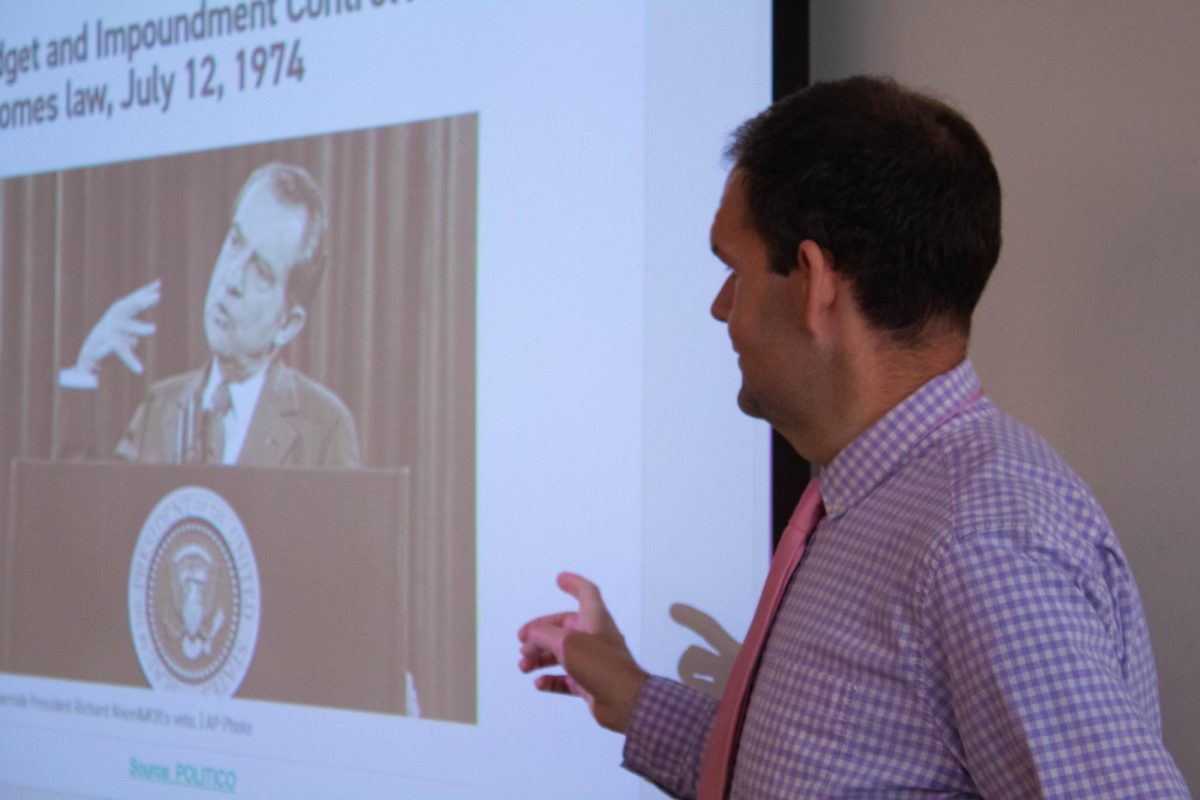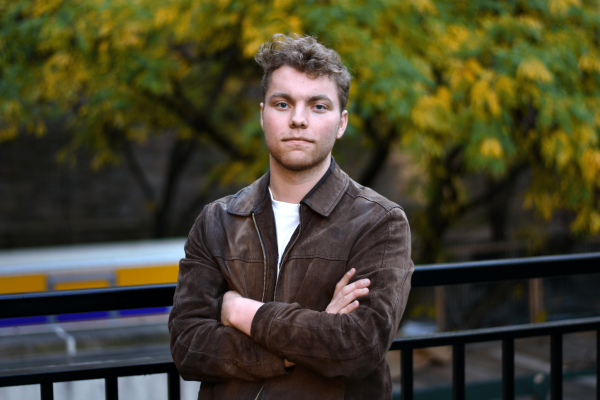A small group of the Fordham community learned about the federal budget process at a midday lecture on April 15.
Jacob Smith, an assistant political science professor, gave the talk in McMahon 109.
The event was the fourth in a series of general political education programs hosted by the FitzSimons Presidential Initiative on Civics and Civility. Tony Berry, Fordham’s FitzSimons fellow, moderated the event and introduced Smith before his talk.
“He focuses his research and teaching on the intersection of American politics and public policy.” Tony Berry, FitzSimons Fellow
“We’re fortunate enough to have professor Jacob Smith lead today’s conversation about the congressional power of the purse,” Berry said from the front of the room. “He focuses his research and teaching on the intersection of American politics and public policy.”
Smith, who is in his second year of teaching at Fordham, explained that his intention was to “demystify the budget process to some extent.”
“I think it’s really confusing,” Smith said. “Like, what needs 60 votes? What needs 51 votes?”
He said it is necessary for the national budget to be created by Congress, and not a solitary executive.
“That’s what the Constitution says. But also it’s desirable to have a Congress that’s having a big role in the budget process,” Smith said.
Smith began the lecture by asking the audience, less than a dozen people, a couple of questions about shopping lists.
Hypothetically, Smith proposed, what would you say if instead of buying every item on your shopping list, the person you entrusted to do your shopping buys “two bottles of Two-Buck Chuck and three large candy bars and nothing else? Who thinks that’s okay?”
No one in the room raised their hand.
Smith went on to explain how, on a given shopping list, there can be reasonable variation in properly buying every item. However, there’s also “things that might not be okay based on the directions that you gave someone,” Smith said.
Smith then brought the hypothetical into reality, explaining how President Donald Trump and his executive administration, within their first week in office, sought to withhold federal funding that had already been approved, under a provisional budget.
The Office of Management and Budget, an executive branch office, prompted widespread confusion and concern when it sent out a memo on Jan. 27, stating that, “to the extent permissible under applicable law, Federal agencies must temporarily pause all activities related to obligation or disbursement of all Federal financial assistance.”
The budget office has since rescinded the memo. But President Trump’s administration has continued to work to reduce the amount of federal money going to overseas aid through the United States Agency for International Development (USAID) and the size of the Department of Health and Human Services (HHS).
“This has had some real consequences: USAID funding that reduced deaths among children and anyone of reproductive age. HHS layoffs that are hitting senior citizens and those with disabilities. So, there are a lot of real consequences to what’s going on,” Smith said.
“My hope is that they’ll latch on to something that maybe they’re passionate about whether that is international aid, or whether that is actually getting into politics themselves in some way, shape or form.” Tony Berry, FitzSimons Fellow
Smith then talked for the next 40 minutes about the minutiae of the federal budget process and all the different processes that go into those decisions. He took a few questions at the end before breaking for lunch.
Berry explained after the lecture that the event, and the FitzSimons civics lecture series in general, were meant to create spaces where members of the Fordham community can “come and they can learn about different topics that relate to civics going on in the news, but foundation civics things tied to the Constitution.”
Berry added that the kinds of political powers these FitzSimons events have covered — federal budgets, executive authority, tariffs, foreign aid spending — are “also topical issues” that Fordham students can watch play out on the world stage.
“I’m hoping that they become more knowledgeable in the topics that they discuss,” Berry said. “My hope is that they’ll latch on to something that maybe they’re passionate about whether that is international aid, or whether that is actually getting into politics themselves in some way, shape or form.”
Philip Judge S.J., Fordham’s director of Campus Ministry , said he had been following these FitzSimons lectures for the past few weeks.
“Obviously, they’re timely,” Judge said. “It’s just interesting to get some — not insider — but educated opinions on what’s happening in the country right now.”
Adding to the point Smith made in his lecture, Judge explained that for him, alarm bells are going off.
“In two months we’ve upended so many things with nothing else in place — and how much real damage that’s done along the way. And there doesn’t seem to be any way to slow that down or question it, or stop it. And that’s concerning,” Judge said.
He said that he truly believes people care about other people. “So, when you take things away from numbers, and take things away from lies and look at real people, that makes a difference,” Judge said.


